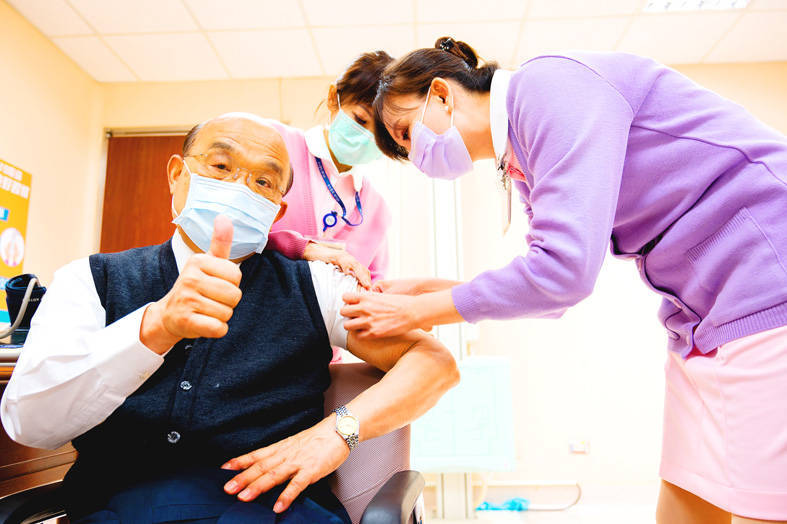《TAIPEI TIMES》 Taiwan begins COVID-19 vaccinations

A nurse administers a dose of AstraZeneca COVID-19 vaccine to Premier Su Tseng-chang, left, at National Taiwan University Hospital in Taipei yesterday, the first day of the nation’s vaccination program. Photo: CNA
LOCAL DOSE? Asked if President Tsai Ing-wen would also get an AstraZeneca shot, her spokesman said it would be more meaningful if she receives a locally manufactured drug
By Lee I-chia / Staff reporter
The nation yesterday began administering the AstraZeneca COVID-19 vaccine, with Premier Su Tseng-chang (蘇貞昌) and Minister of Health and Welfare Chen Shih-chung (陳時中) receiving the jabs first.
Last week, 44,500 doses of the vaccine were distributed to 57 designated hospitals nationwide to start inoculating healthcare workers yesterday.
To reassure the public that the AstraZeneca vaccine is safe, Su and Chen arrived at National Taiwan University Hospital (NTUH) at 7:40am to receive the first two shots of the vaccine in Taiwan.
As the vaccination procedure was not open to reporters, the Executive Yuan and the Central Epidemic Command Center (CECC) later released video footage and photographs of Su and Chen receiving the shots.
Before leaving the hospital, Su told reporters that he did not feel any pain or soreness where he received the shot on his left arm, and that he was not feeling any discomfort or a fever after resting for 30 minutes after being vaccinated, in line with the center’s advice.
The doctor advised him to drink plenty of water and get some rest, he added.
Chen said he “feels very safe” after receiving the vaccine, adding that he would receive the second dose on May 17, as it needs to be administered eight to 12 weeks after the first one.
Su posted a photo on Facebook at about noon with the caption: “COVID-19 vaccination starts today.”
“Under the recommendation of the CECC’s specialist advisory panel and assistance from NTUH, I received the first dose of the COVID-19 vaccine this morning,” he wrote.
“Vaccination of front-line healthcare workers has also started to expand the vaccine safety net. Our goal is to achieve herd immunity,” he wrote.
The imported vaccines have been checked and the government would continue to closely monitor the health of vaccine recipients, he added.
At the CECC’s news conference in the afternoon, Chen, who heads the center, said he was not feeling any discomfort other than “a little soreness in the back” near the injection site.
CECC specialist advisory panel convener Chang Shan-chwen (張上淳), who also received a shot yesterday morning, said all vaccines could cause adverse events, but most of them are mild symptoms that can be relieved quickly and their incidence rates are acceptable.
An assessment of the AstraZeneca vaccine by the European Medicines Agency (EMA) last week found that “the benefits of the vaccine in combating the still widespread threat of COVID-19 continue to outweigh the risk of side effects,” he said.
The assessment was conducted after several European nations suspended AstraZeneca vaccinations after reports of blood clots.
“The EMA also confirmed that the vaccine is not associated with an increase in the overall risk of blood clots in those who receive it, and there is no evidence of a problem related to specific batches of the vaccine or to particular manufacturing sites,” Chang said.
However, the agency could not rule out that the vaccine might be linked to very rare cases of blood clots associated with thrombocytopenia, but more scientific evidence is needed to prove a causal link, he said.
Citing data from the 2009 H1N1 flu pandemic as evidence of the benefits of vaccination, Chen said vaccination coverage in France remained low at 7.8 percent at the time, due to public fears of post-vaccine Guillain-Barre syndrome, of which only a single case was reported, and 312 people died of the flu in the country — a mortality rate of 4.8 deaths per million.
In comparison, vaccination coverage in Taiwan was nearly 25 percent, so reported cases dropped significantly after vaccines were distributed, resulting in 49 deaths and a mortality rate of 2.1 deaths per million, he said.
Chen said that as of noon yesterday, 35 hospital superintendents from the 57 hospitals had received the AstraZeneca vaccine.
Asked if President Tsai Ing-wen (蔡英文) should also get vaccinated, Chen said that it would be more meaningful for the president to receive a shot of a locally produced COVID-19 vaccine, when it becomes available, but the decision would be made by Tsai’s medical team.
Presidential Office spokesman Xavier Chang (張惇涵) said the president and vice president would be willing to take actions that benefit the nation’s disease prevention, including getting vaccinated.
A professional assessment would be made by Tsai’s medical team and the CECC, he said.
Additional reporting by Yang Chun-hui
新聞來源:TAIPEI TIMES















